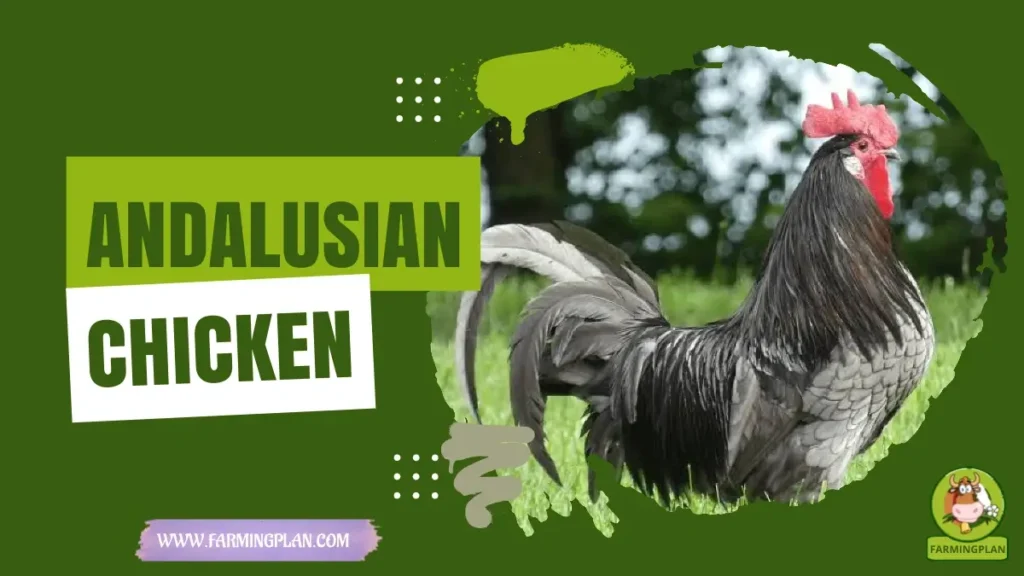The Duclair Duck is a truly special breed loved by farmers and pet owners alike. Known for its elegant flavor and colorful appearance, this duck stands out among other flavorful duck breeds. Whether you’re interested in duclair duck eggs, raising white Duclair ducks, or simply curious about this hardy bird, you’ll find everything you need to know here. From its unique traits to care tips for first-time duck owners, the Duclair Duck offers a perfect mix of beauty and usefulness for backyard duck raisers and breeders alike.
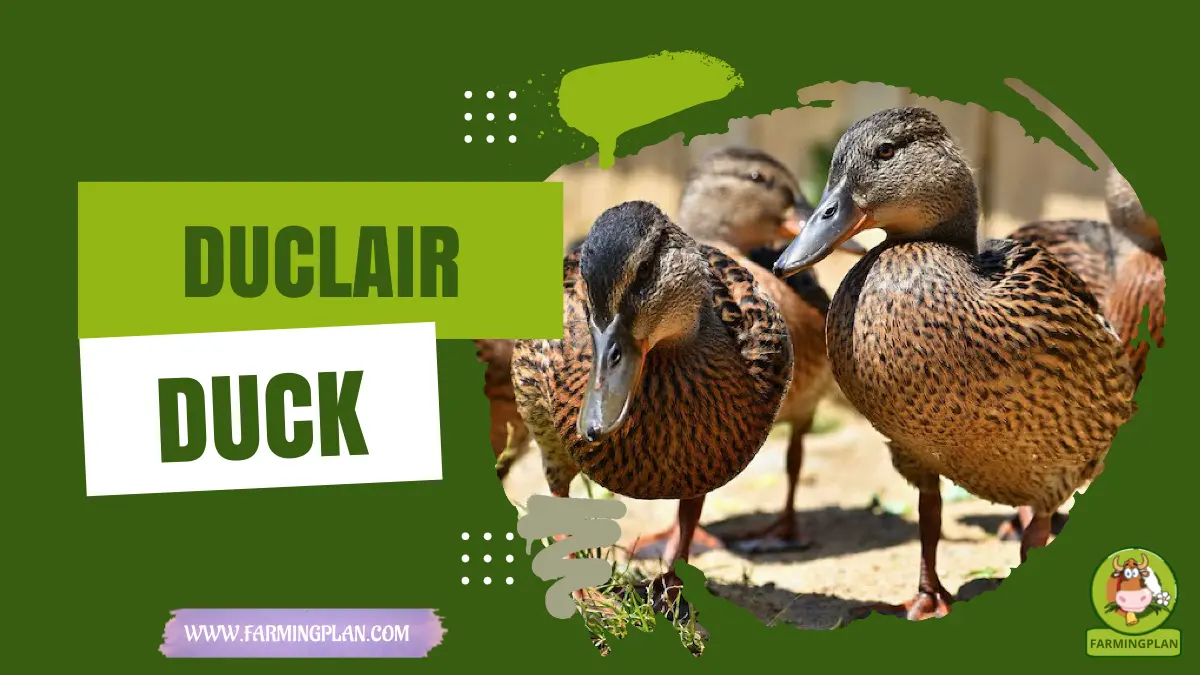
History & Origin of the Duclair Duck
The Duclair Duck has deep roots in the rich agricultural traditions of northern France, specifically in the Normandy region. Named after the town of Duclair, located along the Seine River, this breed has long been celebrated for its exceptional meat quality and elegant flavor, earning it a special place in French culinary history. French chefs often refer to it as the Canard de Duclair, using it in gourmet dishes that highlight its tender, juicy texture and balanced fat content.
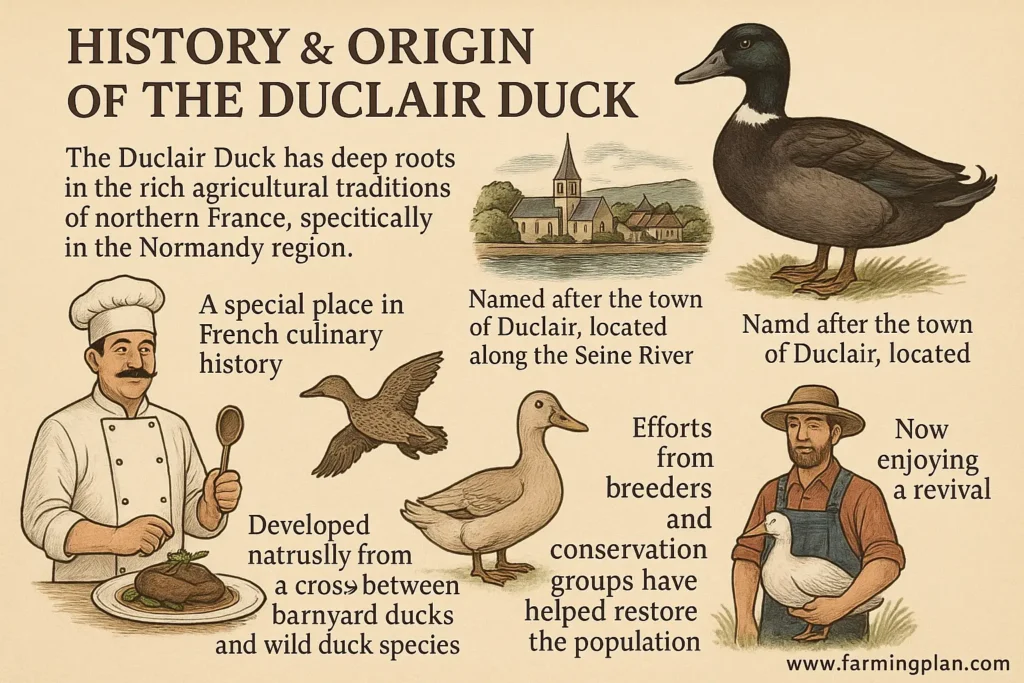
Historically, the Duclair Duck developed naturally from a cross between barnyard ducks and wild duck species, resulting in a hardy, flavorful breed that thrived along riverbanks and farms. Farmers prized the Duclair for being easy to raise, productive, and resilient. Over time, careful selection helped shape its signature features, black or blue plumage with a distinctive white bib, and its reputation spread beyond local markets into international kitchens.Though once at risk of disappearing due to the rise of commercial duck breeds, efforts from local breeders and conservation groups have helped restore the Duclair Duck population.
Characteristics of the Duclair Duck
The Duclair Duck is a unique and beautiful breed known for its balanced size and elegant appearance. Adult Duclair Ducks typically weigh between 6 to 8 pounds, making them a sized duck that fits perfectly in both small farms and backyard setups. Their feathers usually feature a mix of dark greenish-black and white, though the white Duclair duck variety is especially popular among breeders who prefer a cleaner, classic look. When they hatch, yellow ducklings quickly grow into strong birds with smooth plumage.
One of the most prized features of the Duclair Duck is its reputation as one of the most flavorful duck breeds available. The meat is tender and has a delicate, slightly sweet taste that makes it a favorite for roast duck dishes among discerning chefs and food lovers alike. This quality makes Duclair Ducks valuable not only for home farmers but also for specialty markets and traditional products.
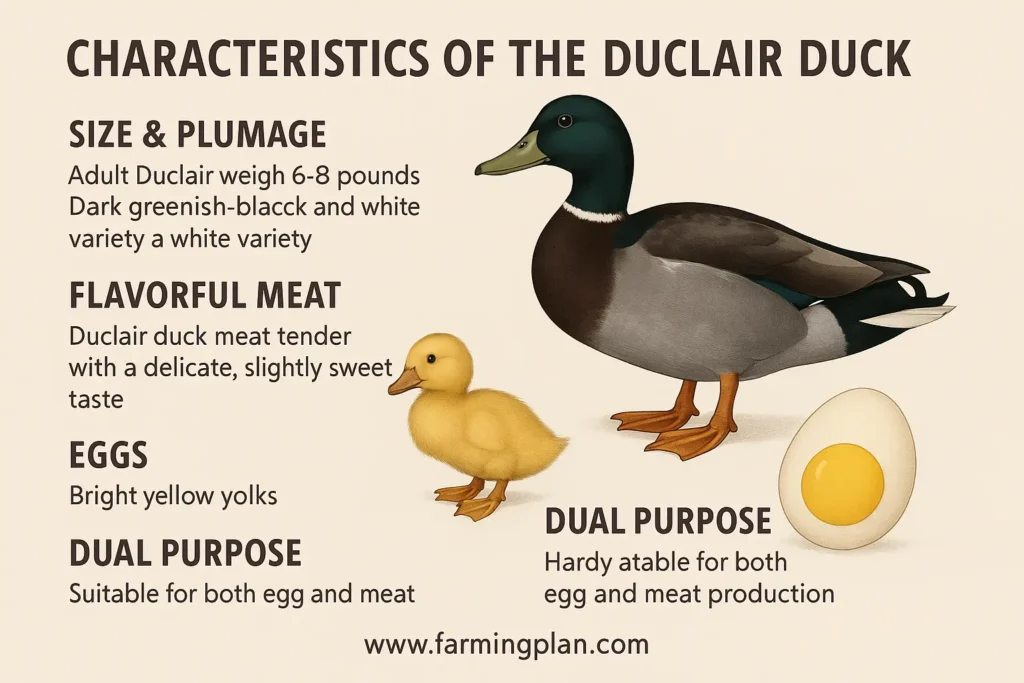
In addition to their meat, duclair duck eggs stand out with bright yellow yolks, sometimes affectionately called yellow balls, which are perfect for baking and cooking. While these eggs are smaller than some others, they are famous for their good flavor and nutrition.
Because the Duclair has a spacious body and strong legs, the breed can survive in many different climates. Compared to other meat ducks or Indian ducks, the Duclair holds a special place for being a true dual purpose bird, excellent for both eggs and meat. Their gentle nature and colorful feathers have earned them the nickname “duckiest duck” among enthusiasts.
Nature and Temperament of Duclair Ducks
Being calm and friendly, the Duclair Duck is popular with all kinds of duck enthusiasts. Since they like being with their family, these ducks act happiest and healthiest in peaceful places surrounded by company. Unlike some wild or more aggressive breeds of duck, Duclairs have a gentle temperament that makes them easy to handle and care for.
Read More : Aylesbury Duck: Raise England’s Finest White Duck
Duclair Ducks are also quite hardy, adapting well to various climates and conditions. This hardy bird quality means they are less prone to stress and common illnesses, which is great news for pet owners and farmers who want low-maintenance birds. They get along well with other domestic ducks and colorful ducks in mixed flocks, helping create a balanced and lively environment.
One thing to keep in mind is that some Duclair Ducks can occasionally experience leg problems, especially if their living space lacks proper footing or exercise opportunities. Ensuring they have access to clean duck water and a spacious area to roam helps maintain their health and comfort.
Their calm nature also makes them good for families or hobby farmers who want a quiet, easygoing bird. If you’d like to keep birds who lay plenty of eggs and are wonderful pets, you can’t do better than Duclairs. A lot of people describe them as among the friendliest and most pretty ducks to keep.
Food and Diet for Duclair Ducks
Feeding your Duclair Duck the right diet is essential for keeping these happy ducks healthy and productive. Duclairs thrive on a balanced diet that includes regular duck food supplemented with natural treats. High-quality pellets or mash designed specifically for ducks should form the base of their nutrition, providing essential vitamins and minerals.
Fresh duck water is just as important as food. Ducks drink a lot and need clean water not only to stay hydrated but also to help them swallow their food properly. Offering access to shallow water sources encourages natural behaviors like dabbling, which keeps them active and happy.
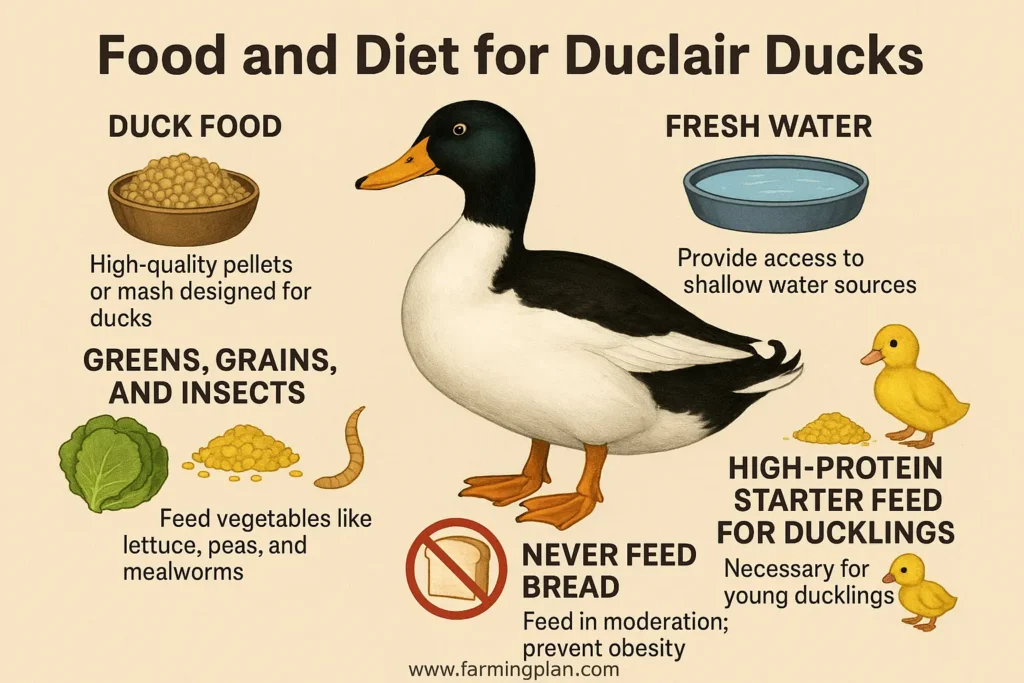
In addition to commercial feed, Duclair Ducks enjoy fresh greens, grains, and insects. Feeding your pet vegetables such as lettuce or peas and sometimes mealworms, will make their diet more interesting. Never give them bread or other processed foods, because these may be harmful to their health. For those raising duclair ducklings, the diet needs special attention. Young ducklings require a high-protein starter feed to support rapid growth. Gradually introduce them to adult feed as they mature, and always provide clean water nearby.
A common question among breeders is whether duclair duck eggs can be fed back to ducks. While possible, it’s generally better to reserve the eggs for consumption or sale, as feeding eggs may encourage egg-eating behavior. Remember, overfeeding can lead to obesity and leg problems, so feed in moderation and monitor their weight regularly. Proper nutrition plays a big role in keeping Duclair Ducks as hardy birds that flourish in both farm and backyard settings.
Usage and Purpose of Duclair Ducks
The Duclair Duck serves many roles, making it a favorite among farmers, chefs, and pet owners. Primarily, these ducks are valued as dual purpose birds, providing both high-quality meat and flavorful eggs. Their tender, rich meat is especially popular for roast duck dishes, prized by discerning chefs for its elegant flavor. This makes Duclairs an excellent choice for anyone looking to raise meat ducks with a gourmet touch.
Read More : Call Duck: Fall in Love With the Friendly
Duclair Ducks also make wonderful pets and show birds. Their calm temperament and striking plumage appeal to backyard duck raisers and hobbyists interested in colorful ducks. Because of their hardy nature, they thrive in a variety of settings, from small urban backyards to larger farms.
Breeders appreciate the Duclair for its strong genetics and role in preserving traditional duck strains. These ducks often participate in duck festivals celebrating heritage breeds and specialty products.
Happy Ducks Are Healthy Ducks, Give Your Duclair The Best Care, And They’ll Reward You With Flavor And Friendship!
Special Features of Duclair Ducks
There are a number of special traits that make the Duclair Duck popular with both farmers and fans. The hardiness of wood is one of its greatest qualities. This hardy bird adapts well to different climates and environments, making it suitable for a wide range of backyard setups and farms. Its ability to thrive in both wet and dry conditions gives it an edge over other breeds. Its special feature includes the vivid yellow balls that describe its eggs.The attractive appearance of these eggs, plus their rich taste, help make duclair duck eggs more valuable both in markets and when cooked.
The Duclair Duck’s balanced size makes it a perfect dual purpose bird, combining excellent meat quality with good egg production. Because it looks and acts like a classic duck, this breed is often called the “duckiest duck.” For breeders, the Duclair’s ability to maintain pure lines is a key benefit. It produces purebred ducklings that help preserve the traditional duck strain. This makes it an ideal choice for those committed to maintaining heritage breeds.
Health Issues & Prevention for Duclair Ducks
Like all breeds of duck, the Duclair Duck can face some common health challenges, but with proper care, these birds remain strong and hardy birds. One frequent concern is leg problems, which may occur if ducks don’t get enough exercise or if their living area has poor footing. Providing soft, dry ground and plenty of space to roam helps prevent these issues.
Respiratory infections can also affect Duclairs, especially if they live in damp or overcrowded conditions. Signs include sneezing, coughing, or labored breathing. Keeping their environment clean and dry, with fresh duck water available, reduces the risk.
Parasites, like lice and mites, can bother these birds, so regular health checks and treatments are essential. Some owners also watch out for egg-laying problems, which might indicate nutritional deficiencies or stress. Preventive care for Duclair Ducks includes balanced nutrition, regular cleaning of housing areas, and vaccinations where recommended. First-time duck owners should educate themselves on early signs of illness to act quickly.
Raising Duclair ducks can be a rewarding experience, whether you’re doing it for their delicious meat, unique eggs, or simply as part of a sustainable homestead. To ensure success, follow these comprehensive steps that cover everything from habitat setup to health care.
Step-by-Step Farming Guide for Duclair Ducks
Raising Duclair ducks can be a rewarding experience, whether you’re doing it for their delicious meat, unique eggs, or simply as part of a sustainable homestead. To ensure success, follow these comprehensive steps that cover everything from habitat setup to health care.
Step 1: Preparing the Ideal Living Space
A healthy environment is the foundation of successful duck farming.
- Shelter Design: Build or purchase a duck house that is dry, draft-free, and well-ventilated. Make sure it offers at least 4–6 square feet per duck inside and more outdoor space for roaming.
- Outdoor Run: Fence an outdoor area using predator-resistant wire mesh (preferably hardware cloth). Ducks love to explore and forage, so allow space for walking, dabbling, and foraging.
- Bedding: Use straw, pine shavings, or hay as bedding. Keep it dry and change it regularly to prevent mold and ammonia build-up.
- Water Access: Place shallow pans or kiddie pools outside the house for swimming and dabbling. Inside, provide deep enough containers for them to dip their bills and clear their nostrils—but not so deep that ducklings risk drowning.
- Drainage: Ensure the space has proper drainage to avoid standing water, which can attract pests or promote disease.
Step 2: Feeding the Ducks Properly
Proper nutrition is crucial for growth, egg production, and overall vitality.
- Ducklings (0–3 weeks): Start with a high-protein (18–22%) unmedicated waterfowl or non-medicated chick starter feed. Avoid medicated chicken feed—it can harm ducklings.
- Growing Ducks (4–16 weeks): Gradually switch to a grower feed with slightly lower protein (15–17%). Transition slowly over 5–7 days to avoid digestive issues.
- Adults (16+ weeks): Use a balanced layer or maintenance feed. Ensure it’s specifically made for ducks or supplement chicken feed with extra niacin (e.g., brewer’s yeast).
- Supplements:
- Fresh greens (lettuce, kale, dandelion).
- Grains like oats or corn.
- Occasional treats: peas, watermelon, chopped vegetables (avoid salty, sugary, or processed foods).
- Water: Ducks must always have access to clean, fresh water, especially when eating. They need it to help swallow and digest food properly.
Step 3: Establishing a Daily Care Routine
Consistency in care keeps your flock healthy and productive.
- Morning Check:
- Release ducks into the run.
- Refresh their water and feed.
- Observe their movement and behavior.
- Midday Tasks:
- Top up water if needed.
- Remove any spoiled food or wet bedding.
- Evening Routine:
- Check for eggs in nests.
- Lead ducks back into their shelter.
- Lock the shelter securely to prevent predator attacks.
- Weekly Chores:
- Deep-clean the coop.
- Scrub water and feed containers with mild soap and rinse thoroughly.
- Rotate bedding material and compost the used ones properly.
Step 4: Protecting Your Flock from Predators
Duclair ducks are vulnerable, especially at night, so strong protection measures are necessary.
- Predator-Proof Shelter:
- Use solid walls with no gaps or holes.
- Install a locking mechanism that raccoons can’t open.
- Secure Fencing:
- Use hardware cloth buried 12 inches underground to deter digging animals.
- Cover the top of the run to prevent hawk or owl attacks.
- Motion Lights or Alarms:
- Install solar-powered motion-sensor lights.
- You can also use noise alarms or predator decoys (like fake owls).
- Daily Lockdown:
- Always lock ducks inside at dusk.
- Do a headcount before closing the shelter to ensure no duck is left behind.
Step 5: Breeding and Egg Management
Breeding Duclair ducks or collecting eggs can be both fun and profitable.
- Nesting Boxes:
- Place clean, dry nesting boxes inside the duck house.
- Fill with soft straw or shavings to encourage laying.
- One box per 3–4 hens is sufficient.
- Egg Collection:
- Check for eggs daily, ideally early in the morning.
- Store eggs in a cool, clean place.
- Mark breeding eggs if incubating, and turn them daily if using a manual incubator.
- Breeding Tips:
- Use one drake for every 4–6 hens for optimal fertility.
- Avoid overcrowding during mating season.
- Ensure good nutrition for breeding pairs, including calcium supplements for hens (e.g., crushed oyster shells).
Step 6: Monitoring and Maintaining Duck Health
Early detection of health issues helps prevent outbreaks or permanent damage.
- Common Issues to Watch For:
- Leg problems: Waddling, limping, or splayed legs may indicate a niacin deficiency—add brewer’s yeast to feed.
- Respiratory signs: Wheezing, sneezing, nasal discharge. Improve ventilation and consult a vet.
- Parasites: Check feathers for mites or lice; keep coop clean and dry.
- Vaccination and Deworming:
- Consult a local vet about region-specific disease prevention.
- Use natural dewormers like pumpkin seeds or follow a vet-recommended schedule.
- Behavioral Red Flags:
- Isolation from the flock.
- Changes in appetite or droppings.
- Feather loss not related to molting.
- Veterinary Support:
- Build a relationship with an avian or poultry vet.
- Keep first-aid supplies handy (electrolyte powder, wound spray, vet wrap, syringes).
Raising Duclair ducks successfully requires dedication, consistency, and a clean environment. These birds are hardy and friendly but depend on you for food, protection, and health management. Whether you’re keeping them for eggs, meat, or companionship, following this guide step-by-step will help ensure your flock stays happy, active, and productive all year round.
Expert Tips & Best Practices for Duclair Ducks
Raising Duclair Ducks successfully requires some insider knowledge from seasoned breeders and backyard duck raisers. Here are some expert tips to help you get the best results:
- Choose Quality Stock: Start with healthy purebred ducklings from reputable breeders to ensure strong genetics and fewer health issues.
- Maintain Clean Water: Ducks love water, but dirty water can lead to illness. Change duck water frequently and provide shallow pools for natural behaviors like dabbling.
- Feed Balanced Diets: Use regular duck food designed for their life stage. Supplement with fresh greens and insects to keep your ducks happy and healthy.
- Prevent Leg Problems: Offer soft ground and plenty of space for exercise. Avoid slippery surfaces to reduce stress on their legs.
- Monitor Breeding Carefully: If you plan to breed, keep track of your duclair duck eggs and ensure nesting boxes are comfortable and clean.
- Social Environment Matters: Ducks are social creatures, so keep them in groups to promote well-being and reduce stress.
- Seasonal Care: Adjust feed and shelter based on the season. In colder months, provide extra warmth and dry bedding.
FAQ
What is a Duclair Duck?
The Duclair Duck is a dual purpose bird from France, known for its flavorful meat and rich eggs. It is a hardy and elegant breed popular among farmers and pet owners.
Are Duclair Ducks good for beginners?
Yes! Duclair Ducks have a calm temperament and are ideal for first-time duck owners and backyard duck raisers due to their friendly nature and easy care requirements.
What do Duclair Ducks eat?
They thrive on regular duck food supplemented with fresh greens, grains, and insects. Clean duck water is essential for their health and digestion.
Do Duclair Ducks fly?
Like most domestic ducks, Duclairs can fly short distances but generally stay grounded, making them easy to manage in a fenced area.
Where can I buy purebred Duclair Ducklings?
Reputable breeders, duck festivals, and specialty poultry farms offer purebred ducklings. Always choose sellers with positive customer reviews and reliable shipping policies.
Conclusion
The Duclair Duck is a remarkable breed that combines beauty, flavor, and friendly nature into one hardy bird. Whether you’re looking to raise a productive table duck, enjoy rich duclair duck eggs, or add a charming pet to your backyard, this breed delivers on all fronts. With proper care, feeding, and attention to health, you can enjoy a thriving flock of some of the sweetest ducks around. Embracing the Duclair Duck means bringing a piece of traditional farming history into your home while benefiting from a versatile and elegant duck breed.

